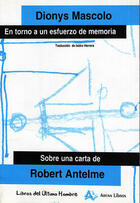
In 1986 Dionys Mascolo finds, almost by chance, the letter that Robert Antelme addressed to him on June 21, 1945. With "ageless words" affected by an "original indeterminacy", an indicator of the cruel innocence of unusual speech, the letter it says at the same time the reincarnation of the person who signs it, his return to humanity, and the essential dispossession that occurs in that return. Those lines, the first ones written by the friend returned from exile in the camps, offer through oblivion the unexpected possibility of reading in their light what will come next.
The unspeakable nature of Antelme's experience, its impossibility of being communicated as well as its need to be shared, there were some, including Mascolo himself and Marguerite Duras, who could never escape. "Deported with him", "Judaized forever", "turned communists in their souls", they lived together durin...read more













